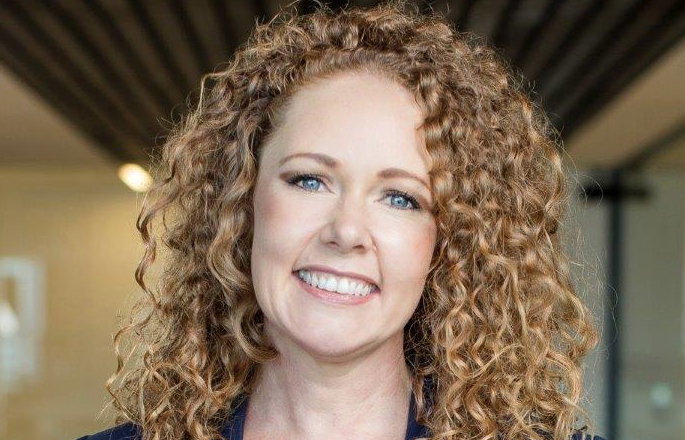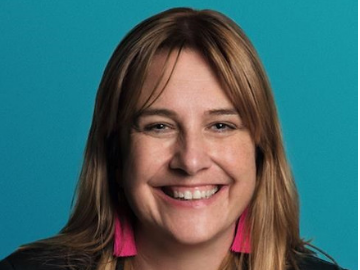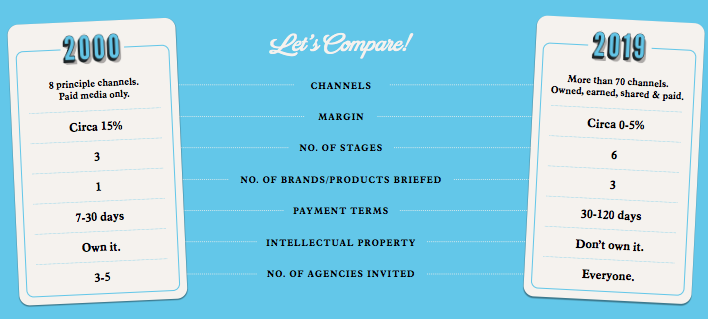
Ditch the pitch: Clients respond to agencies’ calls to reform the pitch process
Mat Baxter blasted the entire “dog and pony show” pitch process in his Mumbrella360 keynote, but was especially concerned with one, unnamed client demanding that media agencies comply with 120-day payment terms. Following his challenge to the industry, media agency bosses weighed in, mostly agreeing that ditching the pitch is unrealistic, but so are payment terms of that length. Now, clients – including Kellogg’s – respond.
When Mat Baxter blasted bad clients from the stage of Mumbrella360, the global CEO of Initiative never explicitly mentioned Kellogg’s by name. He did reference a “CPG client”, though, which was demanding agencies agree to 120-day payment terms in order to participate in the pitch for its media account.
But everybody – the agencies involved in the consumer packaged goods pitch and the industry more broadly – knew the brand he was referring to.
And, if they didn’t, Mumbrella’s Tim Burrowes made the implicit explicit when he wrote in his Best of the Week column: “Without referring to it specifically, Baxter alluded to the current (disgraceful) Kellogg’s media pitch in Australia. It’s an open secret in the agency world that IPG and Omnicom have both told the company to shove it, based on the terms it is demanding from its so-called partners.”

Baxter delivering the Mumbrella360 keynote in which he blasted the pitch process, or what he called a “dog and pony show”
It was just an up-to-date example of one of the issues Baxter was flagging: the growing trend of clients expecting a lengthy credit line from agencies to effectively bankroll their marketing spend.
In recent weeks, Mumbrella has explored the issues raised by Baxter, asking whether media agency bosses will follow the lead of Omnicom and IPG, and decline pitches when the terms are unfair, zooming in on the burnout culture the pitch treadmill can create, and questioning whether agencies would step away from pitching altogether.
In addition to those themes, Baxter took issue with the average cost of a pitch ($300,000), the time it takes to break even after a pitch win (an average of one year), and the steep incline in the number of stages, briefs, and agencies invited to pitch.
Having covered the perspective of agencies, it’s now time for clients – including Kellogg’s – to offer their perspective.
The voice of the big end of town is the Australian Association of National Advertisers (AANA).
While not commenting on the Kellogg’s example specifically, AANA’s CEO John Broome says that contracts need to “advocate for fair renumeration and transparency”.
He argues that if a brand wants something out of the ordinary like extended payment terms, it should pay more.
“If an advertiser’s position is to have extended payment terms – beyond the normal 45 days agencies must make payments to media owners – then with fairness in mind, this must be factored into the price the advertiser pays to the agency as this this will affect the agency’s working capital,” he said in an email to Mumbrella.
Kellogg’s director of marketing and corporate affairs, Tamara Howe, won’t comment on criticism about the pitch’s payment terms, but stresses that agencies need to lean in to win business.
“Pitching in business is also commonplace, for example, we pitch for contracts against competing food manufacturers or we pitch to retailers to gain distribution in store – businesses have to lean in to win business,” she tells Mumbrella.

Howe: Agencies need to lean in to win business
So are there clients who agree with Baxter’s assessment that the pitch process needs an overhaul?
Coles’ relatively newly arrived chief marketing officer, Lisa Ronson, does.
“I totally agree. I think some of the clients that have a better and fairer processes need to share these best practices with those clients that don’t, or are struggling with the process,” she says.
“[It often] comes down to a lack of experience in running pitches. Like any processes in business, they need to be reviewed and optimised to get better outcomes.”

Ronson, Coles’ CMO
Ronson hasn’t been part of a Coles pitch yet, having only been in the CMO role for a few months after moving across from Tourism Australia, but has previously ensured agencies are paid a “nominal” amount to pitch because it’s “good practice”.
“It’s an acknowledgement of the amount of work that goes into the pitch and a sign of wanting to be a true partner with mutually beneficial outcomes,” she explains.
Darren Woolley, who runs pitches at Trinity P3, where he is CEO, warns, however, that some marketers who offer a nominal fee think that it “entitles them to own IP and treat agencies like slaves”.
Baxter is right, according to Woolley, “but the agencies enable this process by being too willing to participate”.
“That is why it is great some are withdrawing from the unfair process to draw attention to it,” he explains, echoing Baxter’s sentiment when he thanked Omnicom’s PHD for stepping back from the Kellogg’s pitch alongside Initiative.
Optus is another brand which says it has has changed its process in response to the cost pressures pitches put on agencies.
“We are very sensitive to the cost of pitching, and believe it should be used only when a company’s capabilities need to be proven,” says Optus’ chief marketing officer Melissa Hopkins.
“In our latest relationship review, we focused on evolution and renegotiation with key existing partners, and were confident in introducing some new partners based on their performance on paid ‘trial’ projects.”
Hopkins believes “there is a time and a place for a pitch if the process is managed correctly” but “if it’s simply a box to tick, then it can be a tremendous waste of resource and intellectual effort”.
“The pitch process does need an overhaul. But it’s not as simple as clients and ‘pitch doctors’ needing to take responsibility. We all do,” she says.

Optus’ CMO, Melissa Hopkins
She adds that there’s often a difference between what agencies say they can do and what they can actually do, and an unfair trend of blaming procurement processes.
“One issue we feel needs to be addressed is the growing gap between many agencies claimed capabilities and their actual, demonstrable capabilities. Sadly, the pitch process remains an important testing ground on this front.
“It’s also frustrating to see procurement processes and departments being used as a scapegoat. When you have agreements in the tens and hundreds of millions of dollars with suppliers, of course we need to partner with procurement departments to ensure we are getting the right partners on the right terms for the right value.”
As for solutions? Baxter offered up his own set of both simple and self-described “radical” approaches. The simple: agencies saying no to unfair terms, clients dealing with costs upfront if it matters most, clients flying to agencies, and procurement incentives for tenure of client/agency relationships. The more drastic answer is ditching the pitch altogether, with clients choosing an agency like they would a law firm or architect.
But Woolley adds that the starting point for fixing the pitch depends on whether you’re an agency or a client.
Clients need to only pitch if there is an “absolute need to go to market” given its cost and risk, have clarity on what a successful outcome looks like – “many advertisers can become confused and distracted by the many and varied agency offerings” – and start with a locked-in process, timeline and time commitment.

Woolley: Only pitch when there’s an absolute need
Agencies, on the other hand, says Woolley, need to remember that the best wins are those you don’t have to pitch for, and therefore pitching is “just one part of your new business strategy”. Think about the return on investment, he advises, including assessing ROI against “financial, employee, and cultural health”.
“Make sure you understand the value you provide and be willing to walk away from a pitch negotiation if that value is not recognised by the client,” he concludes.
“And never, ever try to buy the business with a ridiculous low-ball proposal as it is unsustainable for your business and damaging to the industry as a whole.”
And what of the Kellogg’s pitch, which is sill dragging on? Reportedly, Publicis agency Starcom and Dentsu’s Carat are the remaining contenders.
Howe is quick to emphasise that Baxter’s comments aren’t a fair assessment of the Kellogg’s pitch process, citing an 80+ year relationship with creative agency Wunderman Thompson and a 35-year relationship with incumbent media agency Mindshare as examples of how the brand holds on to “valuable and effective relationships”.
“I can’t speak for other clients, however Mat’s comments do not reflect the process at Kellogg ANZ. We get many requests to work on our business so I think a ‘pitch’ process provides a structured, fair opportunity,” she says.
“We typically shortlist between three and five agencies in our pitch process and tend to undergo two to three rounds. We take a collaborative approach where we’re also involved along the journey.”






Kellogg’s contact in this article is ‘Director of marketing AND corporate affairs'(?). What an untenable position. Since when do they more than marginally overlap? Major red flag. (BTW that’s not a comment on Howe, but rather an indictment on org structure at Kellogg ANZ)
Given there are 6 major markets globally operating on negative interest rates….I can guarantee when interest rates go to negative in Australia, clients operating on 120 day payment terms will quickly change their stance
We need more good clients and more good agencies to stand up here. How a marketer approaches a pitch speaks volumes about how that marketer will approach an agency relationship. Yet even when we at TrinityP3 have declined to manage a pitch process because the basic principles of good business practice are being ignored or sidestepped, there have still been plenty of agencies (and good ones too) willing to participate. That’s why – if we really want to do the hard yards and improve the industry – the pitch needs to become the last resort rather than the first, for everyone involved.
I think Ronson nailed it.
It’s lack of experience on marketer’s part for what is necessary / not necessary for pitch requirements. How often does a marketing team go out to pitch? It’s not frequent enough for a confident approach in most. And if they have frequent experience getting agencies to pitch… ultimately that’s a red flag for the agencies pitching isn’t it?
There needs to be some form of agreed standardisation for pitching, tiered based on requirements, with relative costs associated. If everyone is playing to the same rules, it also makes comparison and selection easier.
Ronson said share the knowledge above, I think that’s the real answer here, it just needs to be applied at scale.
Much of this conversation/debate is focused on media agencies, but now ad agencies are fielding pitches with 120-day terms. In media-land, the client revenue can be worth hundreds of millions so, as Baxter says, after a year, you recoup the $300k spent on pitching. But in ad-land, where client budgets have been slashed year on year and many clients have moved to a project basis rather than retainer, agencies are now pitching for $250k revenue. Which means the agency hopes to make $30-80k profit, yet a pitch still costs $20-80k (internal and external). Even if you make the money back in the first year, there is no second year to make it into profit. Add to that the 120-day term and it is becoming unfeasible for ad agencies to even bother with a pitch.
Takeout: If you’re a client brand and you’re thinking of pitching, you better be offering more than a project and way less than 120-days. Otherwise, no-one is going to give you ads to fill those empty slots you’ve so cleverly got at bargain basement prices.
The old saying, ‘where you stand depends upon where you sit’.
Very revealing to compare and contrast the now-competing stances of two ex-Naked staffers: Mat Baxter as agency CEO, and Ivan Pollard as client CMO stateside at General Mills, who – as Kellogg’s in this market – are currently out to pitch with a demand for 120-days payment terms, and are also copping it hard from an exasperated industry.
As an experienced agency practitioner, I’ve long suggested – only half jokingly – that submissions for these mega-pitches should be just one slide, stating “Whatever they’re charging, less 0.1%”. Would save everyone a lot of time and bother.
Optus commenting on pitch fairness? I once did an Optus pitch, in a room with a table and 5 chairs, which we were allowed to enter early to set up. In walked 5 Optus people and took all 5 chairs, leaving our team to stand up for an hour, the entire pitch session, like schoolchildren in the headmaster’s office. Nothing was offered, other than condescension and arrogance. After, we decided not to await their decision and withdrew our business. Who would ever want to work with such people and such a toxic culture? When will clients learn they’re not Broadway legends casting a smash hit – they’re bores in suits spending someone else’s money.
“…. lean in to win business.”
What the hell does that actually mean?
Having participated in many pitches over the years the consistent lesson is that clients get the supply partners they deserve.
How any client can think that starting a business relationship by imposing highly inequitable terms and expectations on their new partner is going to create fantastic outcomes beggars belief.
While these terms may be imposed on local marketing departments by global H/O, it’s up to the CMO to inject some common sense and take into account their partner’s commercial needs.
The single biggest problem is most marketers don’t understand how advertising works, so they push and push and push what they can understand – price. Anyone worth their salt in media understands that creativity and craft expertise is what drives business results, but in 2019 we still have CMO’s prioritising marginal short-term savings on the single biggest way to put your brand in front of consumers. It’s crazy talk. This attitude is what creates the pitch process we now have – price focussed, with a prevalent lack of respect for the work agencies do, driven by lack of understanding and trust. I’m sure marketers will say agencies need to do a better job of educating, but having personally sat in multiple brand meeting rooms explaining the difference between brand and product to clients, and consistently seeing no behaviour change, I think its clear this is something that needs to be addressed from the client’s side. Educate your marketers, get better results, pretty simple.
It’s just a jump to the left
And then a step to the right
With your hands on your hips
You bring your knees in tight
But it’s the pelvic thrust
That starts to drive you insane
….Let’s do the Time Warp again
Hi Michael
Just as Agencies go through highs and lows, so do Clients.
I don’t recall being part of the pitch – and please shout out if I was.
Optus has shifted and created major change in the pitch process because we saw it is required.
My one request is that agencies given a chance for clients to change, just as much as clients need to give agencies the same.
Lets all embrace change together.
p.s.
Far from a bore in suit too
Melissa is helping lead this change and should be applauded. Thank you Melissa, I hope others follow ‘suit’, pardon the pun.
“Howe is quick to emphasise that Baxter’s comments aren’t a fair assessment of the Kellogg’s pitch process, citing an 80+ year relationship with creative agency Wunderman Thompson and a 35-year relationship with incumbent media agency Mindshare as examples of how the brand holds on to “valuable and effective relationships”.”
You mean the media agency who is declining to pitch on the business is your example of a valuable and effective relationship?
Lean in – I think, in this example, its a euphemism for ‘bend over’